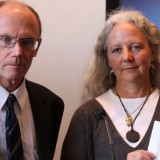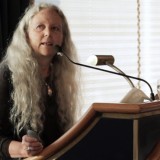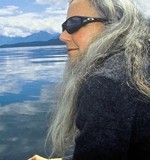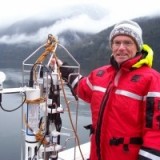Two items came across my desk yesterday that, taken together, illustrate just how embarrassingly backward our BC Liberal government is when it comes to matters of the environment.
One was a transcript from the BC Legislature, wherein NDP Fisheries Critic Michael Sather’s concerns about the discovery of a deadly European strain of Infectious Salmon Anemia virus (ISAv) in wild BC sockeye are egregiously downplayed by his Liberal counterpart, Agriculture Minister Don MacRae. The other was a story in the Seattle Times, documenting the calls for emergency action from 3 high profile US Senators in neighbouring Alaska and Washington State over the very same issue.
Here’s what Washington’s Democratic Senator Maria Cantwell had to say: “We need to act now to protect the Pacific Northwest’s coastal economy and jobs. Infectious salmon anemia could pose a serious threat to Pacific Northwest wild salmon and the thousands of Washington state jobs that rely on them. We have to get a coordinated game plan in place to protect our salmon and stop the spread of this deadly virus.”
Now here’s a transcript of what transpired in the BC Legislature on the same day US lawmakers were sounding the alarm – I’m including a significant chunk of this exchange because it so perfectly illustrates how out of touch this BC Liberal Government continues to be on the salmon farming issue, among many others:
M. Sather (NDP Fisheries Critic): The infectious salmon anemia virus has been discovered in wild salmon in Rivers Inlet. This is a potentially devastating disease that hasn’t been reported before in the North Pacific. The Chilean farming industry was devastated by this same virus: $2 billion in losses, production cut by half and 26,000 people laid off.
We have a lot more to be concerned about here in British Columbia as well. We have our world-renowned sport-fishing industry, our commercial industry and our First Nations food fishery.
Now, Dr. James Winton, who leads the fish health research group at the Western Fisheries Research Center in Seattle, called this outbreak a “disease emergency.” My question to the Minister of Agriculture is: does he agree with the assessment of Dr. Winton?
Hon. D. McRae (BC Liberal Agriculture Minister): Well, we’ve got another example of spinning media headlines and fearmongering from the opposition.
The reality is this. The lab results were sent to PEI. They were not following protocol when, instead of actually contacting CFIA, they went directly to SFU, which in turn went to the media.
When CFIA then, in turn, said, “We’d like to do our test samples,” and said, “We’d like to test the fish,” well, unfortunately, I’m advised that the tested-positive results at the PEI lab were destroyed, and therefore, not available to CFIA….
….M. Sather: Well, in my time in this House that has got to be one of the worst answers I have ever heard. The minister is really making a mistake in going this route.
Those fish were tested by the World Organisation for Animal Health. Now, if the minister wants to quibble with the worldwide body that’s responsible for fish health, go ahead — fill your boots — but you’re making a big mistake. And you’re making a big mistake about not taking what’s happening to our fish, our wild fish, our salmon farm fish in this province…You’re not taking it seriously, Minister, and you ought to be ashamed and apologize right now.
Mr. Sather is right. Dr. Fred Kibenge, who did the testing, is a man of peerless credibility on this matter. Out of the Atlantic Veterinary College at the University of PEI, he runs one of only two labs in the world approved by the OIE (the world animal health organization) to report ISAv. It is his lab that diagnosed and reported the Chilean outrbreak of ISAv several years ago. Mr. Sather is correct to suggest that questioning Dr. Kibenge’s credentials is a dead end for those who are foolish enough to pursue it.
As to Mr. MacRae’s other insinuations, I interviewed salmon biologist Alexandra Morton – who has been working with Professor Rick Routledge of SFU, who collected and forwarded the samples – by phone this morning and here’s what she told me about the testing procedure:
This past Spring, Prof. Routledge, concerned about low numbers of out-migrating smolts in the area of Rivers Inlet, collected 199 smolt samples to be tested at a later date. He had no idea at the time some of these fish would come back positive for ISAv.
The fish were stored in a freezer through the summer. In October the hearts of 48 of these fish were removed by Prof. Routledge’s assistant and sent directly to Dr. Kibenge’s lab (each test costs upwards of $40 and this is an operation with little to no funds, so only a quarter of the fish were tested). Under these circumstances, the heart was the most reliable piece of tissue on which to perform the testing.
Now, these are very small fish with very small hearts, so Dr. Kibenge used up all the tissue in the testing process. This contradicts what the BC Liberal Agriculture Minister alleged yesterday – that the samples were “destroyed”, which implies a cover-up of some nature. That’s simply not the case. As soon as the test results were confirmed, Dr. Kibenge alerted the CFIA (Canadian Food Inspection Agency), as per his legal responsibility.
Furthermore, earlier this week, officials from the CFIA showed up at Prof. Routledge’s SFU lab and confiscated the remaining 151 untested fish from the lab’s freezer. We can only assume they now have these fish in their possession, hearts and all.
All Prof. Routledge appears to have done is collected fish samples, where neither senior level of government would, and forwarded them to the top expert in North America for testing – which, in turn, revealed the devastating fact that a European strain of the deadly ISAv in now infecting BC’s wild sockeye.
Those are the facts.
Here are some more facts that shed light on the Province’s defensiveness. It is the BC Government that has been responsible for auditing fish health on salmon farms, up until the transfer of aquaculture jurisdiction to the federal government in January of this year. Incidentally, there is no evidence of any auditing process by any government body since April 2010 – when the fish farmers told the Province they no longer “required” its services (i.e., “Go away.”) And because fish health auditing is not a licensing requirement for the farms, they got away with it.
One man, Dr. Gary Marty, was responsible for the autopsies of fish from the farms in BC. The only person he ever showed his results to was Dr. Mark Sheppard, formerly of the Province as well. It was Sheppard who acted as the buffer between the raw data and what other government bodies and the public got to see.
The point is that much of what we’re discussing here is on the BC Government’s watch – which, like I say, may help explain their appalling defensiveness on the ISAv matter.
One other note, the person responsible for testing wild fish health in BC, Dr. Christine MacWilliams, asserted recently at the Cohen Commission on collapsing Fraser River sockeye, that if ISAv ever did show up in BC, it would be coming from fish farms – not from the wild. The fact that this is most definitely a European strain of ISAv should remove all doubt that this disease now hitting BC’s wild salmon comes from the fish farm industry.
What is gauling in the BC Agriculture Minister’s response to this crisis is his government’s utter disregard for the Precautionary Principle. US lawmakers are correct in their response – it’s time to go into emergency mode, not to bicker about testing protocols and worry about butt-covering.
Alexandra Morton is now calling for Dr. Kibenge to be provided the resources to come out to BC and set up an emergency lab on Vancouver Island to begin testing all species of wild and farmed salmon, as well as herring.
That’s a sound recommendation which both federal and provincial governments would do well to adopt post haste.
This is no longer a matter to leave to our backward, incompetent, self-interested BC Liberal Government. This is an international issue of grave import, as our neighbours to the south and north are reminding us. We have a duty to work with them to address this matter with the utmost sense of urgency.
As Michael Sather said, unlike the devastation of Chile by ISAv – which I personally documented in 2009 in my film “Farrmed Salmon Exposed” (Chile chapter begins at 2 min mark) – we have much more than the destruction of the aquaculture industry to worry about. This is about our wild salmon, which my colleague Rafe Mair aptly refers to as “the soul of our province.”




